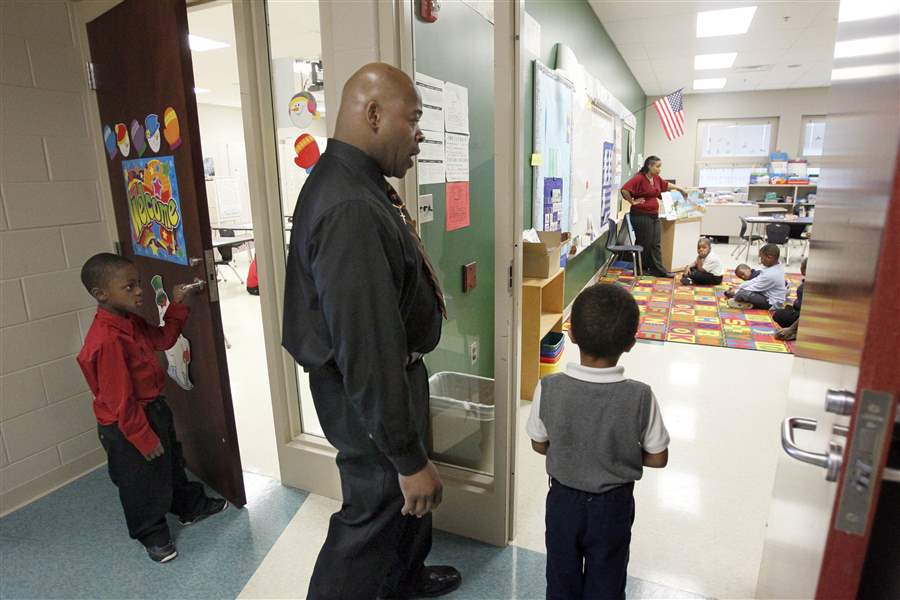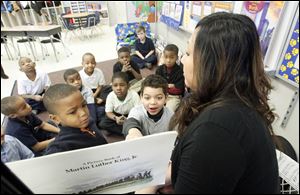
Pride, determination drive MLK Academy to excellence
Building men out of boys is central to school’s success
1/21/2013
Principal Willie Ward escorts two kindergartners back to class after talking with them about proper behavior.
The Blade/Amy E. Voigt
Buy This Image

Peggy Belcher reads a story to her second-grade class at the Martin Luther King, Jr., Academy for Boys. Students Marvon Wadley, left, and Caden Hattfield, right, point out details in the story.
Willie Ward called out for a leader.
"Who is going to lead our song?" Mr. Ward shouted to a lunchroom full of young Martin Luther King, Jr., Academy for Boys students.
Dressed in all black with a gold cross dangling from his neck atop his orange and black Student African-American Brotherhood tie, Mr. Ward had to turn down several volunteers who protested his selection.
RELATED ARTICLE: Ceremony seen as appropriate tribute to MLK
“Stop hatin’. You can do it next time,” he said.
Mr. Ward’s leader stood up and shouted.
“I said King pride!” the boy yelled, and every student called back the same.
“I said K to the I to the N to the G,” the boy led again. “We are the boys of destiny!”
On the south side of Fernwood Avenue at the corner of Forest Avenue is one of Toledo Public Schools' success stories. But on the north side of Fernwood, outside the school's walls, the students' shouts couldn’t be heard.
There was no one around over there, anyway — just the burned-out remains of a house that had served as hangout spot for a Bloods gang and a makeshift memorial to a past gang leader who was killed there in 2011.
King Academy has made a meteoric rise academically during the last two years.
In 2009-10, it was in Academic Emergency on the state report card, then improved to Continuous Improvement the following school year.
Last year, it was rated Excellent — a lofty rating held by few others in the Toledo district last year, even by schools with students of significantly greater means.
And the changes don't stop at the test scores. While academics are stressed at King Academy, the school’s focus is much more on building men out of boys who live in neighborhoods that often have a dearth of male role models.
The school has high expectations for its students, in both academics and life. King Academy models much of its environment after Toledo's other all-male academies: St. John’s Jesuit and St. Francis de Sales.
Its boys, decked out in dress shirts and ties who spout such phrases as “Boys of destiny. Men of distinction” get disciplined at lower rates than other elementary schools in the Scott High School feeder pattern, and are among the most active in the district’s chapter of the Student African-American Brotherhood.
Good things are happening at King. But is being an oasis of achievement enough? Schools, to be truly successful, must be transforming forces for a community.
There's no room for shyness at King Academy. Staff know what their students are up against. Most don’t go far from the neighborhood. But they have higher expectations for the boys.

Principal Willie Ward escorts two kindergartners back to class after talking with them about proper behavior.
Pam Jackson, a fifth-grade teacher, says she frequently teaches about the black people's struggles in the United States, about both the unfairness and the leaders who fought against it. Many don’t expect much from the King boys, but Ms. Jackson tells them to pay no mind.
“Don’t get stuck in the system,” she tells students. “That’s what some people would love to see happen.”
Mr. Ward knows where his students come from. This is his neighborhood.
He spent his childhood growing up on Fernwood Avenue. At times, his family had no money. At one point, his parents moved the family in with Mr. Ward’s grandparents.
The school he now leads is surrounded by poverty. Options for his students are incredibly limited if they don’t excel in school.
But he also knows the power of mentors. Mr. Ward credits much of his success to principals, teachers, and coaches who took him under their wings and served as inspirations.
“Your location does not determine your destination,” Mr. Ward said.
The boys are expected to act like men. It starts with the ties, but the school is built around attention to detail. Students shake visitors' hands and look them in the eye. Anyone taken out of class for misbehavior must request his teacher’s permission to re-enter afterward.
Teachers say the disciplined environment has become ingrained.
“I feel the discipline climate has changed,” second-grade teacher Peggy Belcher said, “The halls are quieter. There’s more learning taking place.”
King's success is all the more surprising since the school nearly closed three years ago. The district’s previous iteration of an all-boys school, Lincoln Academy, suffered from poor results and low enrollment and was scheduled for shutdown.
Romules Durant, a TPS assistant superintendent, persuaded the district to keep the single-gender school concept alive. The solution was to create a triangle school concept, where the boys' academy was moved into the King building, and parents in the area could choose to send their sons to King, daughters to sister-school Ella P. Stewart Academy for Girls, or both to the co-educational Pickett Academy.
Mr. Ward was specifically recruited to King by Mr. Durant, first as a dean and then as assistant principal. The administrators' union had to agree to waive contract rules to allow Mr. Ward into the dean role before he had his administrator’s license.
“We couldn’t just add a position,” Mr. Durant said. “We had to bring someone who would have an impact on the student body.”
He was paired with principal Chad Kolebuck, a highly thought-of TPS administrator who instituted such ideas as “My story” for student test scores, where students were shown where they’ve scored on state tests in the past and given broken-down goals for themselves.
Mr. Kolebuck and Mr. Ward formed a tight leadership team, with Mr. Kolebuck focused on academics and Mr. Ward on mentorship and students' social and emotional development. The pair exemplified how important strong leaders are to school climate and performance.
But the school’s achievements also demonstrate how difficult it is to replicate King’s successes districtwide.
Take the after-school program at King that includes tutoring and enrichment activities. Mr. Ward and Mr. Durant both say the Kids Unlimited program has greatly helped students, but say its success is mostly because of Anthony Johnson, who runs the program at the school, rather than any set curriculum. Without Mr. Johnson, they said, it wouldn’t work.
A system whose success is so tied to dynamic and talented leaders is inherently fragile. People leave. This summer, Mr. Kolebuck took a job in the Sylvania school district. Mr. Ward took over as principal.
New assistant principal Kim Sams said Mr. Ward and Mr. Kolebuck created a certain culture and atmosphere in the school. She’s trying to keep the same high expectations for students, but it’s been an adjustment, especially as a female administrator in a school that found success with male leaders.
But Mr. Ward said the change can be good for students. They’ll need to learn how to live in a diverse world; just interacting well with other men won’t be enough.
“It’s different,” Mr. Ward said of the new leadership team. “But it works.”
The sort of rapid test-score increases that happened at King Academy all too often have been followed in other cities by revelations that the scores were bogus — manipulated by overzealous staff or administrators with financial or career incentives tied to academic improvement.
Fair or not, King's rise thus has attracted skepticism.
“People act like we cheated,” fifth-grade teacher Pam Jackson said. “I was floored when [a friend] said that to me.”
Staff insist the test scores are legitimate, and Mr. Durant said doubters need only look at the school's internal test scores. If they didn't match up, he said, he'd be concerned. But the boys scored just as well when no one else was looking.
Two years ago, King Academy became a magnet school, and may now enroll students from throughout the Toledo school district. Open enrollment complicates comparing magnet-school test scores to traditional schools, because students' school selections indicate a certain level of buy-in to a school’s philosophy, while schools student-body makeup can change from year to year, skewing test trends.
But Mr. Durant and Mr. Ward insist it’s the school that’s changing students, and not the students changing the school.
Nearly all of MLK’s students are from its traditional enrollment boundaries, and students funneled to the school by district administrators aren’t necessarily top scorers. Instead, Mr. Durant said he tends to send students to King if they have behavior problems and could benefit from the school’s single-gender concept and philosophy.
Research is mixed on single-gendered schools, and school leaders concede parents aren’t always keen on an all-boys elementary school — though many, oddly enough, would spend significant money for all-boys high schools. But at least in recent years, it has worked in Toledo Public Schools.
Not only has King raised its scores, but so has Stewart, which jumped in state ratings to Continuous Improvement last year. And often the first thing MLK students mention about their school is that it’s all boys.
Russell Chapman, 10, has been in an all-boys school since kindergarten, first at Lincoln and now at MLK. He’s a fan of the single-gender school, though his parents have split opinions.
“My dad wants me to go to a co-ed school because he wants me to meet girls,” Russell said. “My mom doesn’t want me to meet girls, get distracted, and ruin my whole life.”
Even at a young age, the self confidence and high expectations taught at the school appear to be sinking in. Russell plans to go to college and has pride in King’s recent high scores.
But he said he wouldn’t change if he moved to a different school.
“I’ll just be me everywhere I go,” he said.
That’s part of Mr. Ward’s plan for his students. It’s one thing to get the boys to strive toward becoming men of distinction while under his watchful eye, but it’s another for them to carry it on while outside MLK's walls.
It’s a King philosophy that mentorship isn’t just from staff, but that the students themselves should be mentors to each other.
And so the question isn’t just whether King can sustain its success, but if its students can become leaders in the district, and in the city.
And so, Willie Ward is calling out for leaders.
Contact Nolan Rosenkrans at: nrosenkrans@theblade.com or 419-724-6086.